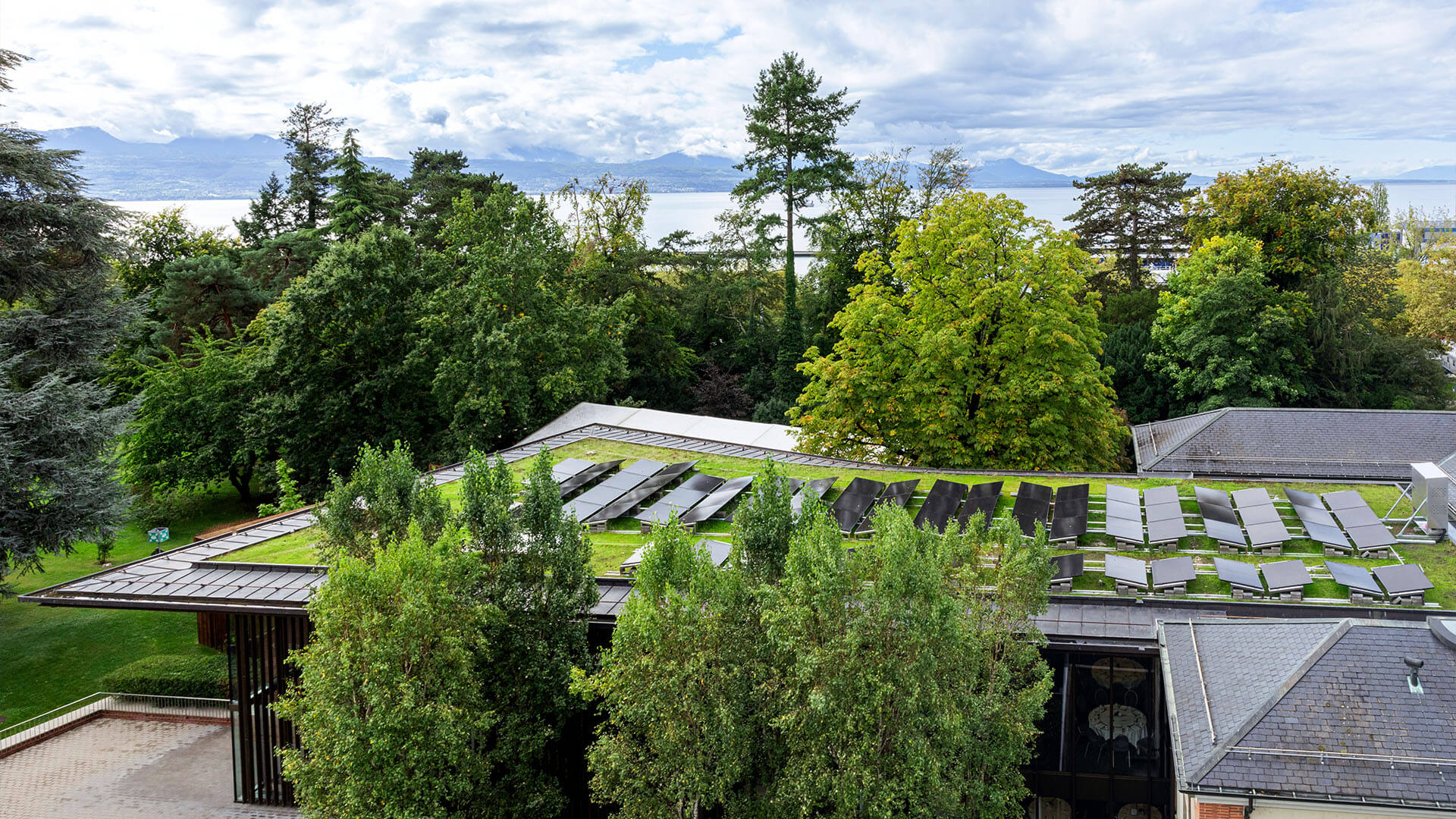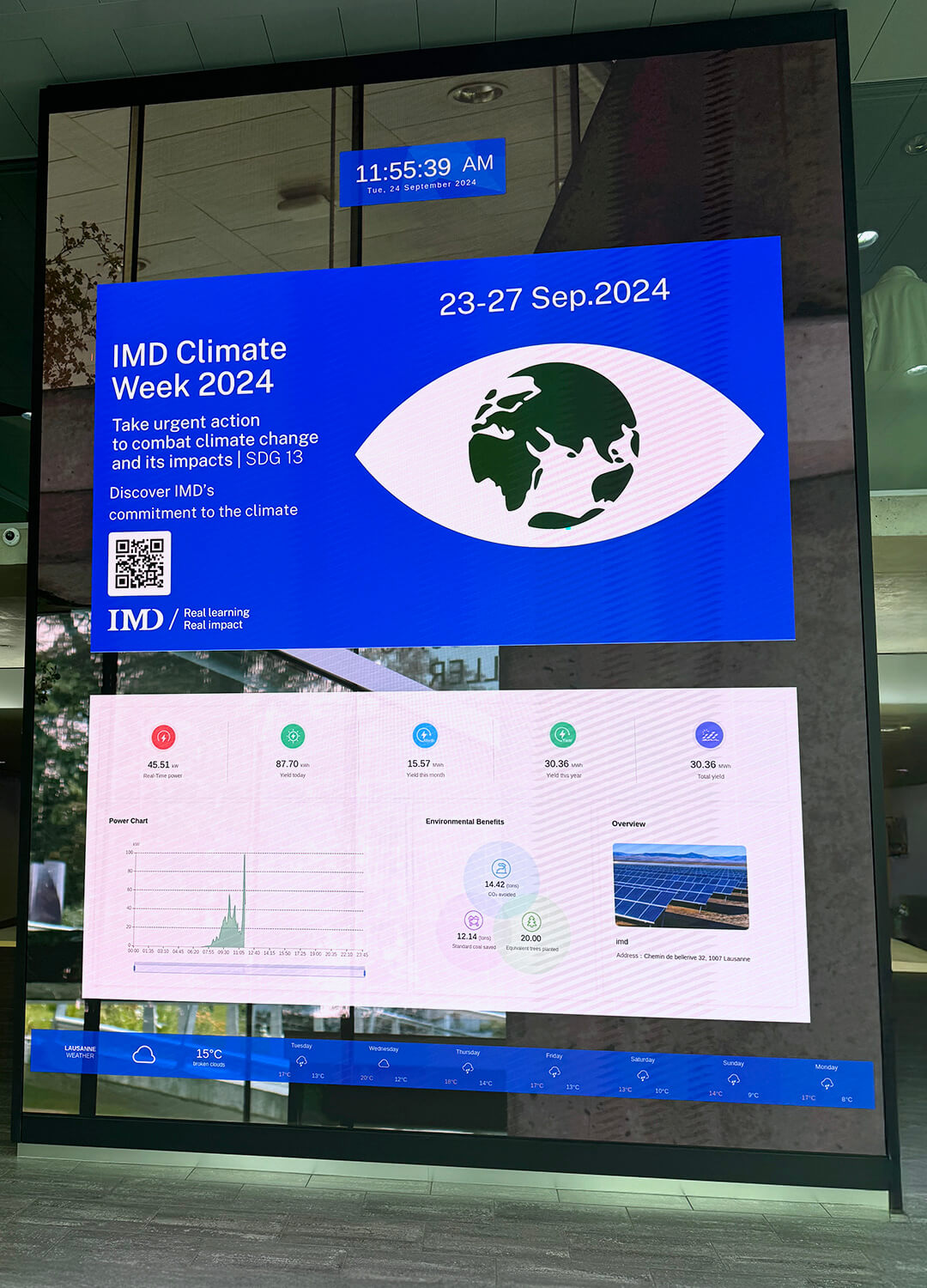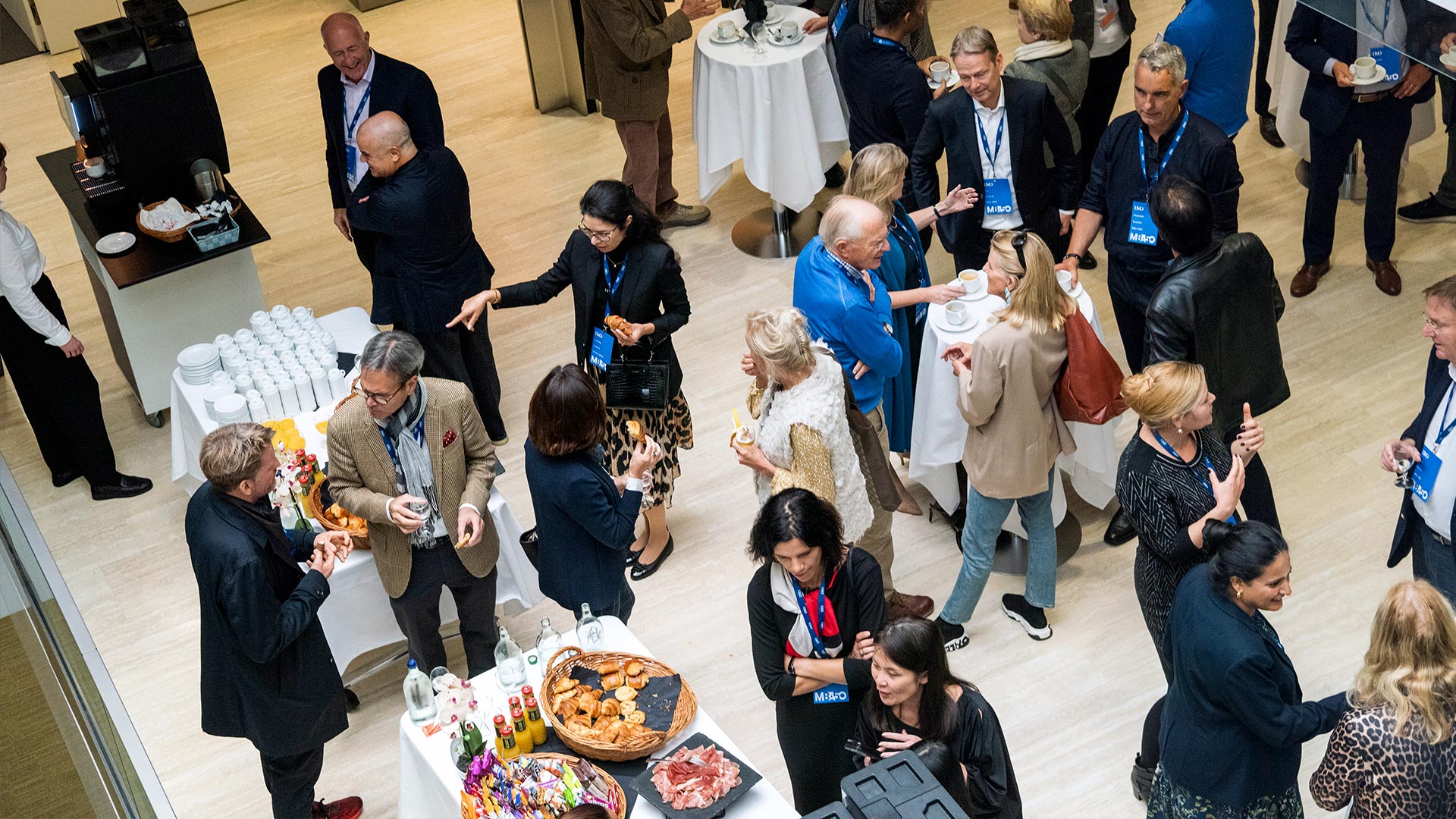IMD business school for management and leadership courses
Our carbon strategy and footprint
We developed a carbon strategy to reduce emissions and enforce our commitment to the SDGs in 2023. Our strategy consists of several steps informed by key standard-setting frameworks, including the GHG Protocol Corporate Standards, Science-Based Targets (SBTi), and the Net Zero Initiative. As part of our commitment, we report on our progress towards reducing our emissions.

We have undertaken an annual carbon footprint assessment to analyze all aspects of our operations since 2022. The current annual footprint includes Scope 1, 2, and 3 emissions for 2024. The methodology conforms with the World Resource Institute’s Greenhouse Gas Protocol, the global standard for companies and organizations to measure and manage their GHG emissions It also complies with the World Business Council for Sustainable Development (WBCSD) and ISO 14064 standards. In 2024, the emissions relating to IMD activities totaled 3790 metric tons of CO2, metric tons of CO₂, of which 89% were derived from Scope 3 emissions.
In 2024, our Scope 1 and Scope 2 CO₂ emissions totaled 424 tons, down from 426 tons in 2023. According to the GHG protocol, the reporting company should report location and market-based values for Scope 2. For IMD, the 2024 values are 574 t CO₂ eq (2023: 602t) and 178 CO₂ eq (2023: 140t), respectively. Nevertheless, we use a tailored impact factor (hybrid) to better reflect energy production and consumption at our Lausanne campus, as Switzerland is our main campus. Scope 1 contributions in 2024 did not differ significantly from 2023, resulting in a minimal increase of 1.5 tons of CO₂ emissions.
Our Scope 3 emissions include purchased goods and services, capital goods, waste generated on-site, employee commuting, business travel, and emissions related to fuels and energy purchased and consumed by IMD. Scope 3 also includes emissions from our Singapore campus, which are considered emissions from upstream leased assets. In 2024, Scope 3 equaled 3,365 tons of CO₂ compared with 2,799 tons of CO₂ in 2023, resulting in an increase of 566 tons of CO₂. The rise in scope 3 emissions is primarily attributed to the construction of new solar panels in 2024, which significantly impacted the capital goods category. For calculating our business travel-related emissions, we included staff travel and mandatory travel that takes place during executive education and degree programs, such as our MBA and EMBA discovery expeditions. The GHG Protocol considers participant travel to and from program locations to be an optional category, similar to customer travel to and from a store. We track an estimate of these emissions for 2024 but kept it separate from overall Scope 3 emissions as the mitigation efforts for this category differ from staff travel, over which we have more control.
Carbon footprint 2024
Carbon footprint 2024
tCO₂ eq
Scope 1
tCO₂ eq
Scope 2
tCO₂ eq
Scope 1
tCO₂ eq
Scope 2
tCO₂ eq
Scope 3
tCO₂ eq
Total
tCO₂ eq
Scope 3
tCO₂ eq
Total
In 2024, we achieved a 19% absolute reduction in Scope 1 and 2 compared to our baseline year measurement. Transitioning from gas to district heating enabled us to significantly reduce the amount of gas needed for heating. Combined with other energy reduction measures, such as the automated lighting system, the contribution of electricity to our total Scope 2 emissions decreased 10% compared to 2023. Scope 1 and 2, the direct emissions from our operations, are where our efforts to reduce CO₂ emissions are most impactful, showing our commitment to meet our impact reduction target for 2030.
Reducing waste and increasing recycling
As an academic institution, we provide educational services. The materials used to develop our activities are mostly renewable and non-hazardous manufactured goods. Our general activities do not generate toxic substances or hazardous waste. Our Campus Services team seeks to continually improve processes to inform decision-making on sustainability and reduce our impact on the environment. We are committed to reducing waste and increasing recycling where we can.
We have an internal waste management system in place, which includes general waste segregation and recycling processes, and the waste generated in our offices is segregated into general waste and paper. We have installed bins in strategic places on campus, reducing the number of individual waste bins next to office desks. A third-party provider collects and transports waste from campus.
At our campus restaurant, we separate organic household and vegetable waste from incinerable waste. This separation allows the local waste recycling company to recover, reprocess, and recycle the useful components to produce biogas and compost. The biogas produced is then added to the natural gas network, providing fuel solutions to the local community.
Total amount of waste in 2024
Cutting our energy consumption
Our Campus Services team monitors electricity consumption on campus and has implemented several measures to improve our campus facilities’ carbon footprint. More renewable energy is being used to provide power on campus.

In 2024, we successfully installed solar panels on two-thirds of our Lausanne campus buildings and aim to install further solar panels. Further, 70% of our campus buildings have an automated lighting system installed and we intend to roll this out further in 2025. All our campus buildings have low-consumption LED lights installed and the standard heating temperature has been lowered across our facilities. Our investment in more energy-efficient IT equipment ensures that we can reduce the operation hours of the heating and ventilation system around this equipment.
In 2024, we completed the transition from gas to district heating for two of our campus buildings, providing 100% renewable and recovered heating. Adding additional campus buildings to the district heating system remains a priority. Our newest campus building, The Mærsk Mc-Kinney Møller Center, is heated and cooled geothermally using water from Lake Geneva. This design sets an environmental standard for future facility projects.
Gas consumption
(kWh in millions)
Electricity consumption
(kWh in millions)
Ensuring sustainable operations
Our commitment to sustainable travel, catering, and procurement enhances our ability to reduce our environmental impact. Promoting and safeguarding biodiversity on our campus also remains a priority.
Our Green Mobility promotes environmentally friendly transportation options for all our Lausanne employees. It incentivizes the use of public transportation, cycling, and walking rather than driving to campus. Further, Phaze Bike SA has sponsored five electric bikes, which are available for employees, affiliates, and MBA students to use. We established a hologram studio in 2024, which provides employees with the option to attend meetings virtually instead of traveling by plane. In addition, we offset carbon emissions from flights taken on commercial airlines.
The IMD restaurant, located on our Lausanne campus, caters to program participants and employees and offers a variety of healthy meals. The menu revolves around ingredients sourced from local and regional areas from Bio-Swiss-certified suppliers. It includes plant-based meat alternatives; by serving more plant-based meals, the restaurant actively contributes to reducing greenhouse gas emissions at source.
We intend to integrate sustainability throughout our supply chain. Our guidelines for sustainable procurement require contracts with suppliers that are environmental leaders in their respective markets and comply with fair, ethical, and socially responsible practices. In 2024, we implemented the Supplier Code of Conduct across our operations. The Code mandates that all suppliers engage in environmental, social, and ethical business practices and values in all products and services they provide.

Promoting and safeguarding biodiversity on our campus remains a priority. Several initiatives on our Lausanne campus are essential for integrating nature into the lives of our community members. These initiatives create a vibrant and dynamic campus landscape and play a vital role in supporting the local ecosystems. Several key measures have been implemented to enhance biodiversity on campus including installing green roofs, keeping flowering meadows and natural grass areas untouched during Spring, preserving old trees, building insect hotels, and a ‘living fence’ on campus.
IMD has joined the Biodiversity Credit Alliance (BCA) as a forum member. As part of the BCA, we engage in global research on voluntary biodiversity credits, exploring their relevance to business practices and their impact on nature-positive strategies.